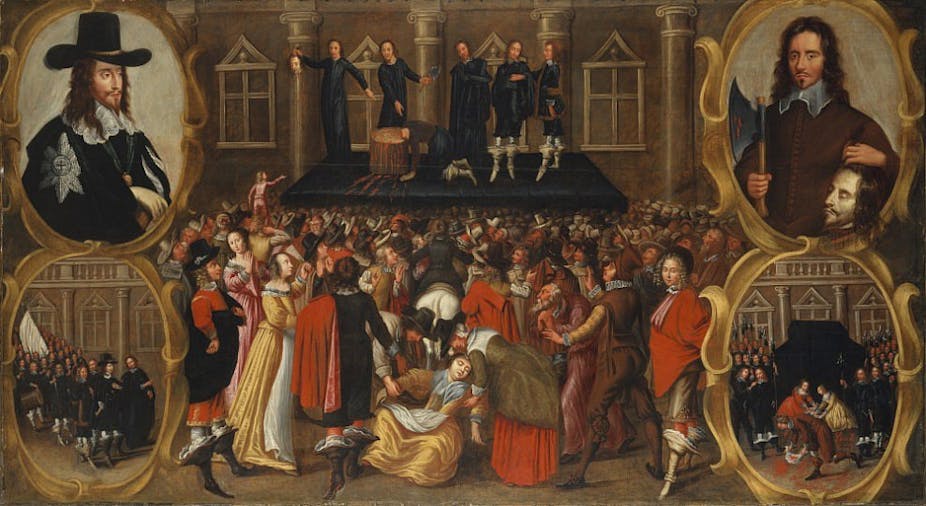The hapless career of Charles I (1600-49) holds tremendously important lessons for Theresa May and her approach to Brexit. The civil wars of Charles’ reign stemmed, in part, from a one-size-fits-all approach to British politics. His inflexibility in dealing with Scottish and Irish anxieties over English-style church and judicial reforms across his kingdoms mirrors May’s resolve to ignore the situation of the devolved assemblies and parliaments of the UK in the wake of the Brexit vote.
Failure to recognise that Britain was made up of distinct civil societies and political establishments cost Charles his kingdoms – and head. Today, if May pursues Brexit without considering the remain votes in Scotland and Northern Ireland, she could be tearing up her own patchwork United Kingdom.
Charles and May make useful comparisons. Both came to power somewhat unexpectedly. Charles’s charismatic older brother Henry died in 1612 leaving the succession open to him. May’s unpredictable rival Boris Johnson was politically assassinated, leaving the field clear for her ascent to 10 Downing Street.
Despite their fortuitous routes to power, both assumed absolute authority over the matters of the day. Charles believed strongly his was a “divine right” to rule. May seems to claim the modern day democratic equivalent – that she, as the champion of Brexit, embodies the “will of the people”.
Charles’ Three Kingdoms
Charles inherited three kingdoms – Scotland, England and Ireland. But each had its own parliament and church. By 1649, the Scottish parliament had taken up arms and taken control of the country. Meanwhile, Ireland had come, for the most part, under the control of Catholic rebels. Before long, Charles was executed for high treason by the English parliament.
It was Charles’s complete mishandling of the Scottish political establishment that led to his downfall. He had failed repeatedly to understand that, though his Scottish kingdom was in friendly union with England and Ireland, it had never ceased to be, or regard itself as, a distinct cultural and political nation. His desire to govern through royal fiat, without recourse to parliament, and his insensitive attempts to reform the Scottish Kirk along English lines alienated supporters in what was still fundamentally a royalist nation.

Unable to negotiate through official channels, the political nation gathered into illegal assemblies (only the king had power to call and dissolve parliaments) and demanded that Charles rule more responsibly. They called, in particular, for him to display greater sensitivity to Scottish interests and feelings. Meeting with no success, the revolutionary assemblies armed themselves and demanded constitutional redress. They wanted to limit the king’s prerogative and emphasise Scottish self-determination. They began to shape an agenda of a more federated Britain. It should have one king but he should have limited powers. There would be a brotherly dialogue between free parliaments across the three kingdoms.
By successfully defending their own right to determine their national fate, the Scots encouraged those who backed the English parliament in its own struggles with Charles. They also gave hope to the embattled Catholics of Ireland, who feared increasing intolerance and political marginalisation. The radical Scots parliament dictated the British political agenda from 1639-45, while seeking sympathetic allies across Europe.
May’s devolution headache
It would be ironic if the move to “take back” British sovereignty broke up the unions that make up Britain. Nicola Sturgeon has fired the starting gun announcing that she will seek another independence referendum next year. Sturgeon claims to have “met with a brick wall of intransigence” when seeking to compromise with the British government.
May, like Charles, should perhaps have payed more attention to the politics north of the border. The devolved assemblies in Northern Ireland, Wales, and Scotland present a serious headache for the current government as it attempts to navigate the murky waters of Brexit. And the case of the 17th century civil wars would suggest that if one British state resists centralised Westminster control, then a domino effect can occur.

Civil war is not, thankfully, on the table today, but a renewed Scottish drive for independence in response to Brexit has already encouraged Welsh nationalists, while Northern Irish republicans are demanding a referendum on their independence from the UK. An inflexible, uniform Brexit deal on May’s part could lead to messy constitutional divorces across the UK.
A British solution?
Charles lost control because he was stubborn when the situation demanded a bit of slack. May’s seeming deafness to devolved concerns, and her unwillingness to really consider the SNP’s suggestions for a flexible Brexit deal could very likely lead to a new indyref in Scotland, increased demand for independence or union with the south in Northern Ireland, and rising nationalism in Wales.
Following the first Scottish independence referendum and even the Brexit vote, constitutional apathy seems to have beset Westminster. Even after those closely fought campaigns there is still a general lack of political will (except in the Scottish political parties) to revisit Britain’s devolutionary and constitutional tangles, to create a settlement fairer for England and the other British countries.
William Davenant, a court poet and playwright addressed Charles on the eve of civil war:
All that are harsh, all that are rude,
Are by your harmony subdued;
Yet so into obedience wrought
As if not forced to it but taught.
This optimism was soon proved misplaced. Britain, now as then, needs more than forced obedience to the “harmony” of Whitehall, or it risks dissolving the unions that created it.

